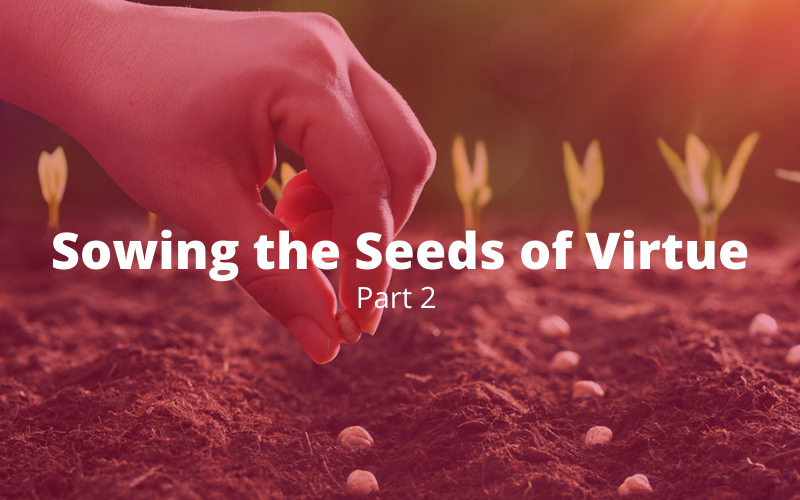By Jason Barney, CDA Principal

In the opening to this series, I discussed the lamentable absence of virtue in our modern thinking about parenting and education. We looked at how the New Testament especially endorses virtue training as part and parcel of Christian discipleship. In 1 Peter we are told to “make every effort” to supplement our faith with knowledge, and knowledge with virtue. Parents are charged with bringing up their children in the discipline and admonition of the Lord.
Therefore, Christian virtue formation is the major goal in a truly Christian education. This is all the more true when we add Christian theological virtues–faith, hope and love–to the equation and don’t settle for the cardinal virtues alone: courage, temperance, justice and prudence.
As we saw in Part 1, a focus on virtue doesn’t have to amount to legalism. Nor does virtue training end in an attempt to play God. As 1 Corinthians 3:6 says, “I planted, Apollos watered, but God gave the growth” (ESV). We can use the God-given means to cultivate Christian growth, even if we are not the ultimate cause of any progress.
But how do we do it? How do we cultivate virtue in the lives of our students, whether at home or in the Christian school? In the next four articles I’m going to discuss memory, habits, ideas and experiences as God-given means to sowing the seeds of virtue in the hearts of our children. In this article we’ll unpack stocking the memory.
Stocking the Memory
The first thing I mean by stocking the memory comes straight out of the Bible. In the book of Proverbs, the prime educational treatise in scripture, we see the power of proverbs and memorable sayings for sowing the seeds of virtue in the hearts of children. Interestingly, there’s a dual location for where this stocking of the memory occurs: the home and the academy. The father and mother, as well as the sage and the tutor are the likely sources of this memorable moral instruction.

How do the mother and father teach their children moral virtue and wisdom? They sow a host of memorable sayings about life into the hearts of their children. This is why we have all those short pithy sayings or definitions as part of our assembly time at Coram Deo Academy. The Coram Deo Shout & Sayings attempt to stock the memory with sayings that will undergird virtue. They are like seeds planted in the consciousness of our students that we hope will issue in the fruit of a good and noble life.
When our students say, “Hustle… to help out,” or “Leave it… better than you find it,” or “Only one life… ‘twill soon be past; only what’s done for Christ will last,” we are trying to cultivate in them the virtues of helpfulness and diligence, cleanliness and responsibility, as well as the Gospel-centered hope of a Contagious Christian and Legacy Leader.
In addition to these shouts and sayings, rehearsed daily in assembly, we recently added an Academic Catechism in Lower School, to sow the seeds of virtue or excellence as it relates to many subjects, and in particular to connect the big picture vision of the gospel and a Christian worldview to all of life.
Stocking the Memory as a Parent
How do I use this tool of virtue development as a parent in my home? First, it’s worth thinking of stocking the memory as both a proactive and a reactive approach to sowing the seeds of virtue.
First, if you see an area of potential weakness in your child, or an active vice, start by stocking their memory with a punchy proverb. Make them say it to you periodically, not just when you are correcting some problem. It may be that there’s one in Coram Deo’s Shouts and Sayings that fits the bill. Or perhaps you can scour through the book of Proverbs itself. Of course, there’s a host of traditional sayings in any language that embody particular virtues or insights on life that might help correct the challenge you’re seeing in your young adult’s life.

This is what I call reactive sowing. It can be as simple as coming up with an image or analogy yourself for what the virtue or vice looks like and talking about it with your child. Even though you are responding to a perceived weakness, make sure not to start this process in the heat of the moment after your child has done the problematic habit again. Instead, have a conversation with your child about the tendency you’re noticing and how and why it hurts them and their relationship with God and others. Then share the saying as a reminder that they can use to help them grow. Reinforce the saying at transitional times during the day and occasionally ask them how it’s going and if they think they are growing in that area.
For the proactive approach to stocking the memory, take some time aside to sit down with your spouse. Brainstorm a list of the virtues that you and your spouse want to be especially characteristic of your family and come up with short sayings that encapsulate them. The culture of your family should play a role here.
Maybe you’ve heard of coming up with a family vision or purpose statement. What I’m suggesting is kind of like that except a little more down to earth and grounded in the practical. Maybe it’s about timeliness, or hospitality, or courtesy, or courageously facing our fears. What do you want to pass on to your children? Make it memorable and say it often and get your kids to say it. They do it at school! I promise they won’t be weirded out if you have them do it at home or in the car.
Of course, these sorts of sayings can become a bit hokey or be potentially over-done. The character of Polonius in Hamlet is a great literary example of the father with a few too many sayings for his children. But arguably, the great defect there is when a parent doesn’t live by their own sayings. So be sure that you are endeavoring to “practice what you preach” when you rehearse sayings with your children.
This approach to sowing the seeds of virtue by stocking the memory with proverbs and sayings is a time-tested approach with the full endorsement of the book of Proverbs. So, I think we’re on safe ground to conclude that it’s worth a try, and worth bringing back from earlier generations to cultivate virtues in our children.
That said, stocking the memory isn’t the only way to sow the seeds of virtue in our children. In the next installments, we’ll discuss habits, ideas and experiences that can shape our children’s hearts.
Check out the rest of this series!
Part 1: Is Virtue Even Christian?
Classical Reading List





